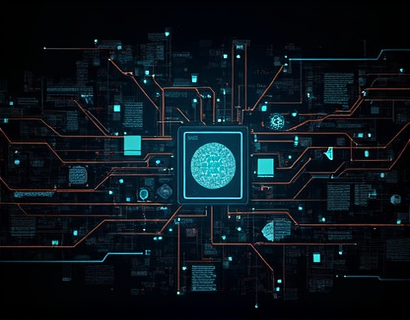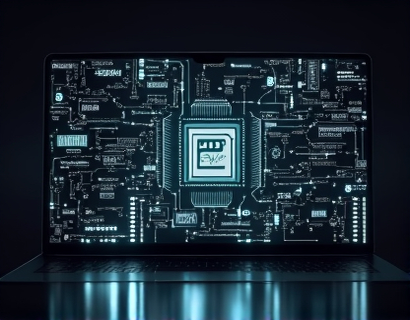Empowering Privacy in Blockchain and AI: Innovative Pseudonym Software for Secure Digital Operations
In the rapidly evolving landscape of technology, the intersection of blockchain and artificial intelligence (AI) has opened new avenues for innovation and efficiency. However, this convergence also brings significant challenges, particularly in the realm of digital privacy. As users increasingly engage with blockchain and AI applications, the need for robust privacy solutions becomes paramount. This article delves into the innovative software solutions designed to create and manage secure pseudonyms, ensuring that users can navigate these complex environments with confidence and compliance.
The concept of pseudonymity is not new, but its application in blockchain and AI is revolutionary. A pseudonym is an alias or a name that replaces a person's real identity, allowing for transactions and interactions without revealing personal information. In the context of blockchain, pseudonyms enable users to conduct operations anonymously, while in AI, they can protect user data and maintain privacy in machine learning models. The software solutions discussed here are expertly designed to facilitate this process, providing a balance between anonymity and regulatory compliance.
Understanding the Need for Pseudonyms in Blockchain
Blockchain technology, known for its transparency and immutability, poses a paradox when it comes to privacy. While the decentralized nature of blockchain ensures that transactions are tamper-proof and visible to all participants, it also means that all activities are recorded and potentially traceable. This transparency can be a double-edged sword, offering security but also exposing users to risks such as identity theft and unauthorized data access.
Pseudonyms in blockchain serve as a crucial layer of protection. By using a pseudonym, a user can engage in transactions without linking these activities to their real-world identity. This is particularly important in jurisdictions with stringent data protection laws, such as the General Data Protection Regulation (GDPR) in the European Union. Pseudonyms help users comply with these regulations by minimizing the exposure of personal data.
Moreover, pseudonyms enhance the scalability and usability of blockchain networks. Without pseudonyms, the sheer volume of personal data required for transactions would be overwhelming and impractical. Pseudonyms allow for a more streamlined and efficient system, where users can transact without the burden of constant identity verification.
Challenges in Implementing Pseudonyms in AI
While the benefits of pseudonyms in blockchain are clear, the application in AI presents its own set of challenges. AI systems, especially those based on machine learning, rely heavily on data to function effectively. This data often includes sensitive information, and the use of pseudonyms must ensure that this data remains protected while still being useful for training and inference processes.
One of the primary challenges is maintaining the integrity and accuracy of AI models when using pseudonymized data. If the pseudonyms are not robust enough, there is a risk of re-identification, where an attacker can link the pseudonym back to the real identity. This not only compromises privacy but can also lead to biased or inaccurate AI outcomes.
Another challenge is the dynamic nature of AI systems. As models are continuously updated and trained on new data, the pseudonyms must adapt accordingly. This requires a sophisticated system that can manage and update pseudonyms in real-time, ensuring that the balance between privacy and functionality is maintained.
Innovative Software Solutions for Pseudonym Management
To address these challenges, innovative software solutions have been developed to create and manage secure pseudonyms for blockchain and AI operations. These solutions are designed to be user-friendly, scalable, and compliant with regulatory standards, providing a comprehensive approach to digital privacy.
At the core of these solutions is a robust pseudonym generation algorithm. This algorithm creates unique and unpredictable pseudonyms that are difficult to trace back to the user's real identity. The pseudonyms are generated using a combination of cryptographic techniques and randomization methods, ensuring a high level of security.
The software also includes a pseudonym lifecycle management system. This system handles the creation, rotation, and revocation of pseudonyms, ensuring that each pseudonym has a defined lifespan and is automatically updated or replaced as needed. This dynamic management is crucial for maintaining the security and privacy of user operations over time.
Seamless Integration with Blockchain and AI Platforms
One of the key features of these innovative software solutions is their seamless integration with existing blockchain and AI platforms. Whether it's a decentralized application (dApp) or a machine learning framework, the software can be easily integrated without requiring significant modifications to the underlying systems.
For blockchain, the software interacts with smart contracts and nodes, ensuring that transactions are processed using the generated pseudonyms. This integration is transparent to the user, who can conduct operations as they would with their real identity, without the need to manage complex cryptographic keys or identities.
In the AI domain, the software can be integrated with data pipelines and machine learning workflows. It ensures that the data used for training and inference is pseudonymized, and that the AI models themselves do not store or expose personal information. This integration is achieved through APIs and middleware that work behind the scenes, providing a seamless user experience.
Ensuring Compliance with Regulatory Standards
Compliance with regulatory standards is a critical aspect of any privacy solution. The software solutions discussed here are designed to meet and exceed the requirements of major data protection regulations, such as GDPR, the California Consumer Privacy Act (CCPA), and others.
One of the key features is the ability to provide users with control over their pseudonyms and the data associated with them. Users can easily manage their pseudonym settings, including the ability to revoke a pseudonym and generate a new one. This control is essential for compliance, as users must have the right to access, correct, and delete their personal data.
Additionally, the software logs all pseudonym-related activities in a secure and auditable manner. These logs can be used to demonstrate compliance during audits and regulatory inspections. The software also supports data minimization principles, ensuring that only the necessary data is collected and processed, further enhancing compliance.
Enhancing User Trust and Adoption
The ultimate goal of these innovative software solutions is to enhance user trust and adoption of blockchain and AI technologies. By providing a secure and private way to interact with these systems, users are more likely to engage with blockchain and AI applications, knowing that their privacy is protected.
User education is also a key component of these solutions. The software includes intuitive interfaces and documentation that help users understand how pseudonyms work and how to manage their privacy settings effectively. This education empowers users to make informed decisions about their digital footprint and builds confidence in the technology.
Moreover, the software can help organizations build trust with their users by demonstrating a commitment to privacy and security. In an era where data breaches and privacy violations are common, the ability to offer robust privacy solutions can be a significant differentiator for businesses and developers.
Future Directions and Innovations
As blockchain and AI continue to evolve, the need for advanced pseudonym solutions will only grow. Future innovations in this space may include the integration of zero-knowledge proofs, which allow users to verify the validity of transactions or data without revealing any underlying information.
Another area of potential innovation is the use of decentralized identity management systems. These systems would allow users to control their identities across multiple platforms and services, further enhancing privacy and interoperability.
Additionally, the development of more sophisticated machine learning models that can work effectively with pseudonymized data will be crucial. These models would minimize the risk of re-identification and ensure that AI systems can function without compromising user privacy.
Overall, the future of pseudonym software in blockchain and AI is promising, with ongoing research and development aimed at creating even more secure and user-friendly solutions.










































